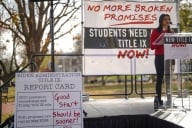You have /5 articles left.
Sign up for a free account or log in.
CAMBRIDGE, Mass. -- Amid the various influences that massive open online courses have had on higher education in their short life so far -- the topic of a daylong conference here Monday -- this may be among the more unexpected: The courses may be prompting some faculty to pay more attention to their teaching styles than they ever have before.
The conference, organized Monday in Cambridge by Harvard University and the Massachusetts Institute of Technology, featured academics and administrators from elite North American universities and other players in the world of MOOCs discussing the rise of online courses and the future of residential colleges and universities.
The new attention to teaching methods and learning sciences is coming from two directions: faculty who want to make sure their teaching is up to snuff for a wider audience, and technology that allows new levels of interaction with students, and new understanding of students' strengths and weaknesses.
Harvard Provost Alan Garber said the free online courses can invite comparisons of faculty and course shopping by students. That, along with their scale -- tens of thousands of students will sign up for a course, versus only scores for a large traditional class -- means MOOC instructors now “are working at an entirely different level.”
“Our faculty are extraordinarily successful,” Garber said. “They are used to winning. And they don’t want to lose this game.”
The head of edX, a major MOOC provider founded less than a year ago by Harvard and MIT, said that faculty members looking to adapt their classes to the Web are able to take advantage of technology that didn’t exist before, like instantaneously computer-graded tests. He said research has shown instant feedback improves outcomes.
EdX President Anant Agarwal said there is certain learning sciences research that many faculty, including himself, had long ignored as they focused on their own disciplinary fields.
“To me, these papers should be must-reads,” he said, citing specifically a 1972 study of memory.
Agarwal said that paper was among the research about learning he had not read until recently. He said he thought other faculty were generally unfamiliar with such research.
"If we followed it, it was completely by accident," he said.
The day of discussion wandered across several key topics, including whether MOOCs can control costs and whether they fundamentally undermine traditional higher education.
Panelists found few conclusive answers to key questions about the future of the residential college, which remains the popular vision of college even though it is no longer how many students receive postsecondary education.
Reporters were invited to the conference, but most of the proceedings, which included remarks by the president of MIT and the MOOC enthusiast New York Times columnist Thomas Friedman, could not be directly quoted according to agreed-to ground rules, though professors were free to talk to the press and top officials were made available for comment at the end of the day.








